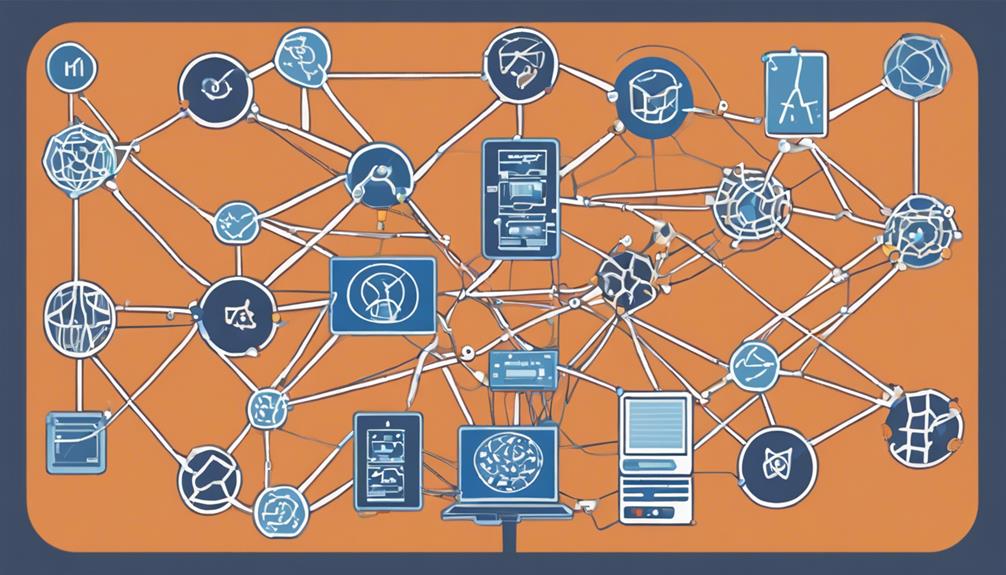When considering the ethical implications of web data mining, you must ponder the intricate balance between technological advancement and individual privacy rights. The digital landscape holds a trove of information waiting to be unearthed, but at what cost? As you navigate the realm of data extraction and analysis, the ethical considerations in web data mining might surprise you. The intricate dance between data collection, user consent, and ethical boundaries reveals a complex web of dilemmas that warrant exploration. The quest for knowledge is noble, but how it is obtained can raise profound ethical questions that demand contemplation.
Data Privacy
When considering data privacy in web data mining, it is crucial to address the ethical implications surrounding the collection, storage, and utilization of individuals’ personal information. Data ownership and transparency play key roles in ensuring that users have control over their data and are aware of how it is being used. Privacy rights must be respected, and data collection should be done in a manner that is lawful, fair, and transparent.
Users have the right to know what information is being collected about them, how it is being used, and who has access to it. Transparency in data mining practices is essential for building trust with users and upholding ethical standards. Data privacy regulations and policies should be in place to safeguard individuals’ personal information and prevent its misuse.
Informed Consent
In the realm of web data mining, understanding the importance of informed consent is crucial. Users must comprehend the implications of their data being collected and analyzed. Implementing privacy protection measures can help uphold ethical standards in this digital landscape.
Consent Importance
Why is obtaining informed consent crucial in web data mining practices? In the realm of web data mining, user autonomy and trust building are paramount considerations. By seeking informed consent from individuals before collecting their data, you respect their autonomy and right to control how their information is used. This process empowers users by giving them a choice in whether they want to participate in data mining activities, fostering a sense of autonomy and control over their personal information.
Furthermore, obtaining informed consent is essential for building trust between data miners and users. When individuals feel that their data is being collected transparently and with their consent, it enhances trust in the organization conducting the data mining. This trust is vital for long-term relationships with users and maintaining a positive reputation in the digital landscape.
User Understanding Needed
To ensure that individuals provide informed consent when engaging in web data mining practices, it is imperative that they possess a clear understanding of the implications of consenting to data collection. User perception plays a crucial role in this process, as individuals must comprehend how their data will be used, by whom, and for what purposes. Without a comprehensive grasp of these aspects, users may unknowingly agree to terms that could potentially compromise their privacy or lead to unwanted consequences.
Ethical implications arise when users are not adequately informed about the data mining practices being employed. Lack of user understanding can result in a breach of trust between the data collector and the individual, raising concerns about transparency and fairness. Therefore, it is essential for organizations engaging in web data mining to prioritize user education and ensure that consent processes are clear, concise, and easily understood. By fostering user understanding, the ethical integrity of data mining practices can be upheld, promoting trust and accountability in the digital landscape.
Privacy Protection Measures
Implementing effective privacy protection measures through informed consent is essential in ensuring ethical practices in web data mining. When users provide informed consent, they are made aware of how their data will be collected, utilized, and protected. One crucial method to safeguard user privacy is data anonymization. By removing personally identifiable information from datasets, individuals’ identities are shielded while still allowing for valuable insights to be derived. Additionally, employing data encryption techniques enhances security by encoding data to prevent unauthorized access. This ensures that sensitive information remains confidential and protected from potential breaches.
Informed consent serves as a foundation for establishing trust between users and organizations engaging in data mining activities. By clearly communicating the purposes of data collection and the measures in place to uphold privacy, transparency is prioritized, fostering a more ethical environment. Upholding privacy protection measures not only aligns with legal requirements but also demonstrates respect for individuals’ rights and autonomy in the digital landscape.
Transparency
When engaging in web data mining, it is crucial to prioritize transparency through data source disclosure and clear privacy policies. By openly disclosing where the data is sourced from, users can better understand the origins of the information being collected. Clear privacy policies further enhance transparency by outlining how user data is handled and protected, fostering trust and accountability in data mining practices.
Data Source Disclosure
One crucial aspect of ethical considerations in web data mining is the transparency of data sources. Data source disclosure is vital for establishing trustworthiness and ensuring data accuracy in the process of web data mining. By clearly disclosing the origin of the data being collected and analyzed, organizations can uphold ethical standards and maintain credibility with their stakeholders.
From a legal standpoint, data ownership is a key issue related to data source disclosure. Organizations must ensure that they have the proper rights to use the data they are mining from various sources on the web. Failing to disclose the ownership of the data can lead to legal implications and potential conflicts with data providers.
Moreover, transparent data source disclosure enhances the overall trustworthiness of the data mining process. When users are aware of where the data comes from, they are more likely to have confidence in the results and conclusions drawn from the analysis. This transparency also contributes to the accuracy of the data by allowing for verification and validation of the information collected.
Clear Privacy Policies
To maintain the trustworthiness and ethical integrity of web data mining practices, ensuring clear privacy policies is paramount. Clear privacy policies play a crucial role in safeguarding individuals’ data security and upholding ethical guidelines in web data mining processes. By clearly outlining how collected data will be used, stored, and protected, organizations can establish transparency and build trust with users.
Ethical guidelines dictate that organizations must inform users about the types of data being collected, the purposes for which it will be used, and any third parties with whom it may be shared. This transparency empowers individuals to make informed decisions about providing their data and helps prevent potential misuse or unauthorized access.
Furthermore, clear privacy policies should also address how data security is maintained to protect against breaches or unauthorized access. By implementing robust security measures and clearly communicating them to users, organizations can demonstrate their commitment to safeguarding sensitive information and complying with ethical standards in web data mining practices.
Accountability
Accountability in web data mining encompasses the crucial aspect of ensuring transparency and responsibility in how data is collected, analyzed, and utilized. Ethical responsibility is at the core of accountability, as organizations must uphold ethical standards when dealing with data ownership. It is imperative for entities engaged in web data mining to recognize the ethical implications of their actions and take ownership of the data they collect from users.
Data ownership raises important questions about who ultimately controls the information gathered through web data mining activities. Accountability requires organizations to clearly define the boundaries of data ownership and ensure that users are aware of how their data will be used. By establishing clear guidelines and protocols for data ownership, organizations can demonstrate their commitment to ethical responsibility in web data mining practices.
Non-discrimination
When considering non-discrimination in web data mining, it is crucial to address the ethical implications of ensuring fair treatment and unbiased decision-making based on the data collected. Bias detection plays a significant role in identifying and rectifying discriminatory practices that may arise during the data mining process. By actively seeking out biases, organizations can work towards creating more equitable outcomes for all individuals impacted by data-driven decisions.
Fair algorithms are key to promoting non-discrimination in web data mining. It is essential to develop and utilize algorithms that are transparent, accountable, and free from biases that could result in discriminatory actions. Implementing fairness into algorithms involves considering various aspects such as demographic parity, equal opportunity, and predictive parity to ensure that decisions made based on mined data do not disproportionately impact certain groups.
Fair Use
Fair use in web data mining refers to the legal doctrine that allows for the limited use of copyrighted material without the need for permission from the copyright holder. When considering fair use in the context of data mining, it becomes crucial to address issues related to data ownership and information sharing. Data ownership plays a significant role in determining what can be ethically and legally used in web data mining practices. Understanding the boundaries of fair use is essential to ensure that data is handled responsibly and ethically.
Information sharing within the realm of fair use involves respecting the rights of content creators while also enabling innovation and research. Balancing the rights of copyright holders with the need for unrestricted access to information is a complex ethical consideration in web data mining. By adhering to fair use principles, researchers and data miners can navigate the ethical challenges posed by data ownership and information sharing, promoting a balanced approach that respects both intellectual property rights and the advancement of knowledge.
Frequently Asked Questions
How Can Web Data Mining Impact Marginalized Communities?
Just like a double-edged sword, web data mining can impact marginalized communities. Privacy implications, social justice concerns arise. Identifying bias and practicing cultural sensitivity become crucial in safeguarding these communities from potential harm.
Are There Guidelines for Handling Sensitive Personal Data?
When handling sensitive personal data, you must prioritize data protection and privacy. Ensuring consent and transparency is essential. Guidelines exist to safeguard individuals’ information, emphasizing ethical practices in handling sensitive data to uphold trust and integrity.
What Measures Are in Place to Prevent Data Breaches?
To prevent data breaches, robust measures like encryption, access controls, and regular security audits are essential. Data security is crucial to safeguard sensitive information and maintain privacy protection. Implementing best practices ensures a proactive approach to cybersecurity.
How Do Companies Ensure the Accuracy of Mined Data?
Ensuring accuracy in mined data requires rigorous data validation processes. Companies employ quality assurance techniques like cross-referencing multiple sources and regular audits. By maintaining high standards, they guarantee reliable insights for informed decision-making.
What Are the Consequences for Unethical Data Mining Practices?
Unethical data mining practices can lead to severe consequences. Legal repercussions may include fines or lawsuits, damaging a company’s reputation. Social impact can erode trust in businesses, highlighting the importance of accountability in handling sensitive data.



